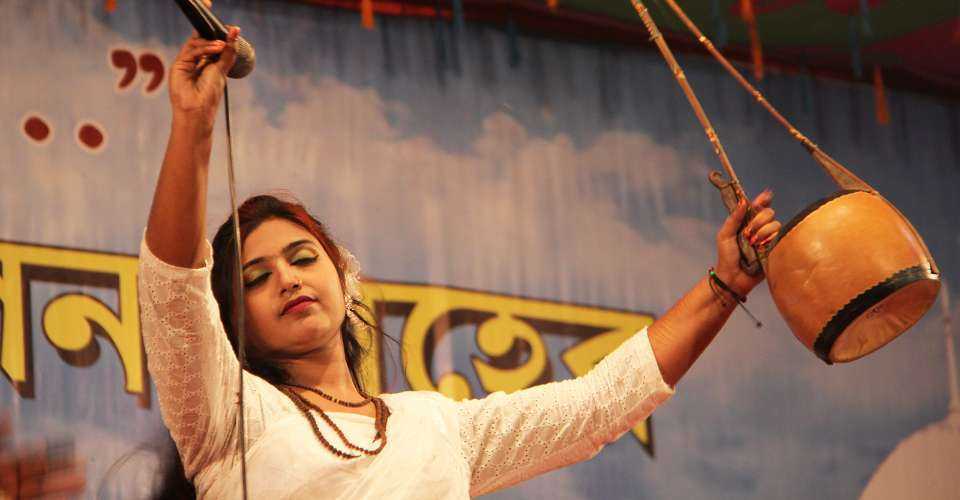
A Baul singer performs a song during a festival dedicated to Lalon Shah, a 19th-century Bengali musician, philosopher and mystic, at Chheuria in Kushtia district in October 2016. (Photo by Stephan Uttom/UCA News)
Rights activists in Bangladesh have slammed police for siding with Islamic hardliners, who attacked a mystic singer for allegedly engaging in unIslamic practices.
Activists have accused the police of attempting to settle the matter out of the court instead of recording it as a criminal case.
"The administrative attempt to conceal a crime" is a concern, said a June 30 statement from 25 leading human rights activists.
A mob of some 50 people burned down the tin-made house of 90-year-old mystic singer Chaina Begum and attacked her on June 26 in her Takimara village in southwestern Bangladesh, local reports said.
The singer is a follower of Lalon Shah, a 19th-century Bengali musician, philosopher, and social reformer.
Begum had built the house recently beside the grave of her husband, Gazi Uddin Shah, who was also a singer and follower of Lalon.
Local media reports said following the attack, the woman fled to an unknown location.
Members of Jamaat-e-Islami, the country’s largest Islamist political party and ruling Awami League, were involved in plotting the attack, local sources say.
Begum’s fellow mystic singers, also known as Bauls, protested the attack, and Begum reportedly filed a police complaint against 40-50 suspects.
The rights groups' statement said the increasing attack on non-Muslims shows the growing influence of Islamic hardliners who routinely target humanists, minorities, and cultural activists in the Muslim-majority nation.
The police attempt to settle a crime of this nature shows "the process of institutionalizing criminal activities to the next level,” the statement pointed out.
It sought stricter rule of law, protection for minorities, and a compensation of some 100,000 taka (US$856) for the victim singer.
Kushtia police station’s officer-in-charge Sheikh Muhammad Sohel Rana claimed the vandalism was not a crime.
“The most important thing is the parties involved wanted to resolve the matter,” he told UCA News.
A family member of Chaina told UCA News that Islamic hardliners have been opposing the mystic singer and her husband.
Baul religious tradition preaches tolerance and humanism. Its philosophy, which fuses the teachings of Hinduism, Islam, and Buddhism, originated in 17th-century Bengal.
Most Bauls are mystic minstrels with no permanent dwelling place. They wear long robes and travel village after village singing Lalon songs using a one-stringed instrument called ektara. They survive on alms.
Islamic hardliners in Bangladesh consider Bauls heretics and frequently attack them, accusing them of engaging in un-Islamic acts and hurting Muslims' religious sentiments.
In 2011, a mob attacked 28 Bauls in Rajbari district and shaved off their long hair and mustaches to socially humiliate them.
In 2014, a Baul singers’ program in Jessore district was bombed. A Baul was stabbed to death in the same year.
In January 2020, top Baul singer Shariat Bayati was arrested following complaints that he violated the Quran, which prohibits songs and music. He was released after two months in jail.
In May of that year, a mob burned down the residence of Baul Ranesh Thakur in northeastern Sunamganj district.


